Buying Back My Kuna/ Travel Story Contest Entry
I know it's kinda long but I promise you won't be bored.
Buying Back My Kuna
My Story of More Adventure Than I Ever Imagined
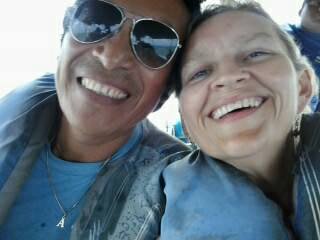
“What are you, the female Indiana Jones?” another traveler asked me while cooking our dinners side-by-side in the hostel kitchen, Magnolia Inn of Panama City’s upscale arts district, Casco Viejo. He found my story about why I needed to raise seven hundred dollars super fast to buy a Kuna to be very fascinating. Every time I told the story someone would overhear fragmented parts and I’d tell it all over again. Most of the time those who listened offered me some sort of assistance whether it be a beer or a couple of twenty dollar bills. Looking back, I still shake my head, finding what I experienced to be mind boggling.
I guess you could say it all began when I accepted a volunteer position at the Hostel Bambu in David (Dah-veed), Panama. At the time, I had been staying with a Tico family in Costa Rica about an hour and a half away. The first time I saw Fabio I assumed he was just another indigenous man worker at the hostel. Low level workers are pretty commonly the indigenous people so I didn’t think much of him. Late one night after a couple beers Fabio escorted me to the big map of Panama hanging on the wall in the Internet room.
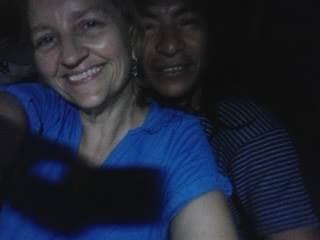
In his gruff squeaky voice, I realized later is a common distinct voice of his people, he pointed to the Darian jungle, explaining where his people, the Kuna’s live. It takes three days to get there because there are no roads, he explained to me. He told me stories of coconuts, wild chocolate, coffee and succulent giant lobsters. Lobster tail has to be my favorite food ever.
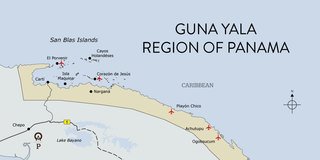
The San Blas Islands lie along the Atlantic coast, between the Panama Canal and Columbia. These islands consist of about three thousand tiny islands but a few of them are larger, housing many Kuna families. These islands are the Gunayala reservation granted to the Kunas in 1925 after they won the Dule Revolution against the Panamanians. I gotta tell yuh, his stories of his home gave this Anthropologist an anthropology hard-on.
Being that I’m a very intelligent woman I asked him when he was going to take me home with him. He replied that he would love to take me because he knows I would really love it there. It was a great fantasy to think about. Playon Chico, his island, is super far and we are so busy. We can’t just stop our lives and go on such a huge trip. Fabio said there are no roads, no cars, no electricity or internet out there. Besides, I just met this guy. I don’t know anything about him.
Because I was a new volunteer I didn’t know that Fabio’s presence at the hostel everyday was not his usual. Normally he sells his handmade jewelry in the streets.
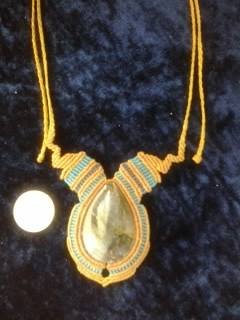
He works for himself and does various odd jobs. His attempts to talk to me were annoying because his English was so bad and he had little patience with my Spanish. Later, I learned that Spanish is his second language as it was for me. When I was working or hanging out he often found ways to assist or entertain me. This indigenous Kuna street artist was very interesting to me.
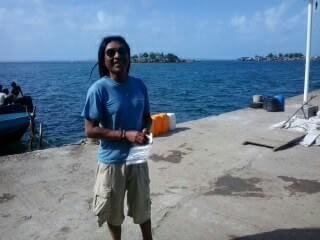
Fabio often wore his long silken black hair in a bun on top of his head. He always wore a tank or t-shirt and bermuda shorts over his soft, dark body. Since he was not attractive to me I couldn’t consider him romantically. However, Fabio certainly had a certain charm and he easily grew on me, becoming more attractive as time went on.
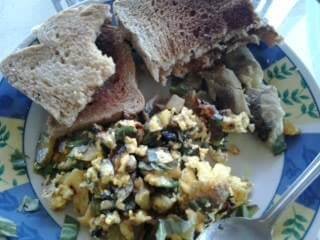
We cooked together, shopped for food together, talked and talked. He helped me manage the overflow of guests at the hostile, make the beds, water the gardens and introduced me to his artist friends.
We laughed and laughed together. Often we just laid around in hammocks listening to music and talking. After a few weeks I caught myself looking for him, aware if he was at the hostel or not. When he wasn’t around I began to notice I missed his company. After several weeks he explained to me about his Kuna people winning a revolution against the Panamanians and Spaniards he also explained how his people celebrate their revolution every year throughout all of February. The Kunas travel from all over to the islands to be with family for the annual month long celebration. At this time he asked if I want to join him this year.
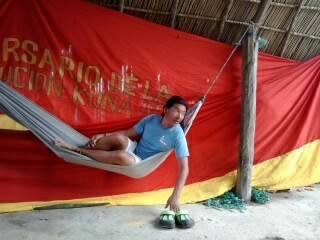
Of course I want to go. These types of experiences really fascinate me. After a brief discussion we agreed to depart in five days. I made arrangements to leave my smaller backpack at the hostel. Since Fabio gives me a hard time about how much stuff I carry I decided to leave some of my stuff there. While I was choosing what I would take with me a strange thing happened to me. A quiet, subtle voice said to me, “whatever you take you will not bring back.” Immediately, I’m shocked and in disbelief.
Did I imagine that? I asked myself. Surely, I am just imagining it. I packed and took with me all of my most valuable things in my big 60L backpack. The morning of our departure we took a taxi to the bus station in David. The bus ride to Panama City was 6 hours long. We spent the night in an overpriced hostel. The next morning we took a walk to the office for managing the Gunayala people and their reservation. About 3 hours later an older Kuna man picked us up from the hostel then drove us for the next several hours through the Darian Jungle and 2 military check points. Fabio told them I was his girlfriend.
We arrived at the coastal office near sunset. After doing some sort of a check-in, showing my passport to some traditionally dressed Kunas we were whisked away to a small passenger boat that took us to a nearby island. I felt like I was in the pages of a National Geographic magazine. Nothing felt familiar to me. Everything was different. We walked through a series of small docks and bamboo structures dotted with busy Kuna natives. Fabio spoke to some of them in his native tongue. Finally, one of them pointed to some stairs then followed us up.
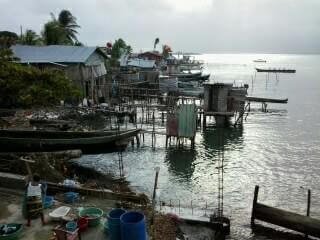
Over the waist-high wall I could see the ocean’s sunset as well as over the entire island covered in bamboo buildings and banana leaf roofs. At the far end the woman strung up hammocks on the white painted beams while Fabio instructed me to rest my backpack against the wall. After we rested in our hammocks a few minutes Fabio jumped up and announced we are going to go get some dinner. I had no idea how this would happen. After we entered the bamboo laden walking path he looked around for landmarks so we wouldn't get lost. Pretty quickly it was clear to me why he did that.
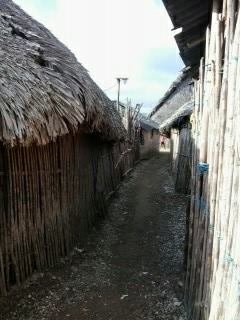
Everything looked exactly the same if you did not have a trained eye. All the bamboo buildings and hallways looked the same. After a series of weaving through hallways, walkways and corridors we approached the other side of the island. There we sat on a bench facing the sea. Shortly a very skinny old man approached and very excitedly shook hands and hugged Fabio. After they spoke together a moment in Sp-una (Kuna and Spanish mixed together) he explained that this man is a very old friend of his father's.
The old Kuna sat down next to me and explained to me that he learned to speak English during the war (not sure which one) while working as a cook on an American ship. I chatted with the interesting old man in his broken English until he was tired then I bid him good night while Fabio landed us a couple plates of food and beers in the “restaurant” we were seated next to. After we devoured our simple Kuna cuisine and drinks we went for a walk around the island. It was fortunate he walked me around and I became familiar with the island. It was never in my wildest dreams that I would ever have to return alone.
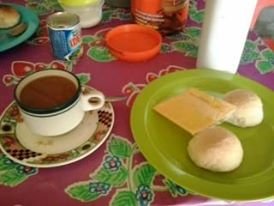
Early the next morning we arose to fresh coffee and a simple, fresh baked rolls breakfast. When the transport boat arrived I was in the bathroom, a simple wooden box in a simple room that hung over the water. When my poop came out I could hear the plopping sound as it hit the water below. When I was done I was exited to see the boat was full of people waiting for me, maybe 30 in all. The man running the boat had already stuffed my bags in the boat by the time he pointed me to the front bench next to Fabio. My knees smashed into the front wall of the boat that was made for short Kunas.
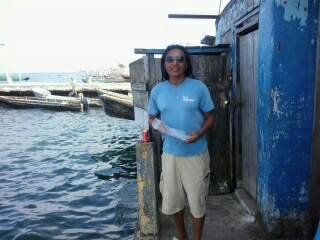
After about three hours of being stuffed into this boat, hiding behind a heavy clear tarp to protect against constant front end of the boat water stream we pulled up to a dock. It led to a small Kuna mainland village of bamboo homes and well beaten walking paths. At the end of the dock was a bathroom opportunity and a nearby store for snacks. My water bottle was sufficient for me. Chips and sodas are not my thing. After about a fifteen minute break we re-squished into the boat. A couple more hours of pounding waves and spraying seawater felt like forever.
At the time I didn't understand Fabio’s excitement over the sight of his tribal cemetery but later when I made the journey alone it totally made sense to me. The end of the long trip had finally come. I barely had my backpack on before Fabio was almost running through the bamboo laden walkways to his cousin, Antilino’s ( anti-leeno) home. His family was very excited to see him being that he had not been back for three years.
Over the next few days I spent resting in a hammock, hanging out with the guys and learning to make jewelry. One evening Antilino asked me what is my favorite food. Remembering Fabio’s stories of the giant lobsters I immediately replied, “lobster!” He was so excited about my answer he could hardly speak. When he described the giant lobsters Fabio had already told me about while I pretended to not believe him, taunting his manhood, sheerly for the purpose of inspiring him to “put his money where his mouth is”, so to speak. My manipulation worked perfectly.

Early the next morning myself, Fabio, Antilino, his two children and their cousin set out in his fourth generation, hand made canoe.
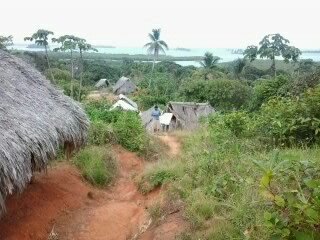
About 15 minutes of watching the men thrusting the paddles together in beautiful unison into the water I began to scan the surrounding islands, noticing how peaceful and pristine the water is and how enchanting all the little islands were. When I turned to look behind me to the island we had just left fear struck my heart, remembering the voice from when I packed my stuff for this journey.
Surely, that huge black cloud of smoke rising from the earth has nothing to do with Playon Chico. I turned to look at the guys to see if they were concerned. Nope. Nothing. They just kept rowing their paddles.
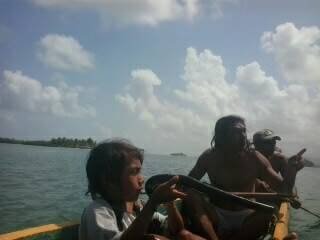
The lagoon area where they dove for lobsters was unsuccessful. After sitting in the canoe for awhile while the guys took turns plunging into the depths of the water, unsuccessfully searching for lobsters they decided to take me and the kids to their family farm island (each Kuna family owns their own island in which to use to farm food) to wait while Fabio and the other cousin go to another lagoon to try. Intending to forget about the smoke proved to be a failure as I several times looked to see if it was still there. The lies I told myself that it was nothing was in vain as I did not believe me.
As I played in the water and sand with the children I could hear Antilino’s voice off in the distance. Since he was speaking Kuna all I could understand was that he was upset. After a few minutes he called to me and the children.
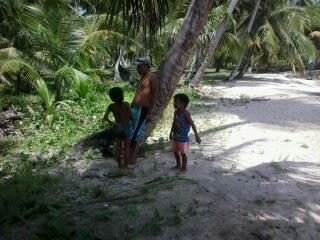
When we walked the hundred yards of beach to catch up to him he was nearly in tears and pointing to the dark gust of smoke that was indeed rising from Playon Chico. He had been talking to his wife on the phone and reported that we have lost everything. The premonition was right.
The other cousin and Fabio returned in the canoe a few minutes later with no lobsters. There will be no feasting tonight.
Antilino told the guys the situation as we slowly loaded back up into the canoe. It was the most surreal experience of my life, that canoe ride back to the residential island.
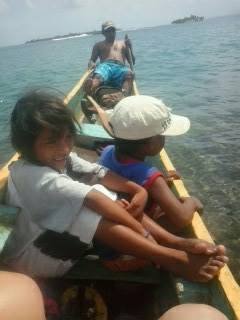
We shifted back and forth from laughing to crying then laughing again. No one spoke a word. Our eyes shifted from the cloud of smoke to the canoe, to the beautiful sea. ”What will I do without my stuff?”, “How will I get back?” I thought to myself.
Without the bamboo buildings and overhanging bathrooms I didn’t recognize our portion of the beach. The docks were gone so a couple of Kunas bent down to grab me and pull me out of the waist high water up to the overhead island ledge.
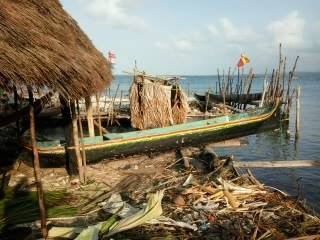
As I peered around I witnessed smoke and burning embers over the whole end of the approximately one square mile island. Everywhere the locals were running to the shore with their buckets and bowls pouring sea water on everything. The smell of smoke permeated my nose.
“Holy shit, Fabio! What the fuck am I gonna do? I guess now I live here. Now I am a Kuna. I’m stuck here with you Kunas.” I exclaimed to Fabio. He immediately replied in his heavy accent, “It’s okay! Is good story for you.” We laughed hard together knowing how true his words were. But this is only the beginning. The story of how we get back to David weeks later is a crazy story.

Since I had my phone in my pocket the whole time I pulled it out and started taking photos. Fabio yelled to me, “Yes, take photos, take photos, take many , many photos.” So, I did. After the fire was put out completely, the people wasted no time putting together temporary buildings.
The next day missionaries came and gave us rice, clean water, clothes, toothbrush and a comb. A woman loaned me one of her traditional Kuna skirts. What to do with this American white lady became a topic to discuss and ponder. Antilino explained that he would go to speak to the chief for some advice on how to get me back to the mainland. My passport, bank cards, money, all identification was now gone. I only had the clothes on my back, my phone, my reading glasses and a half finished bracelet I was making.
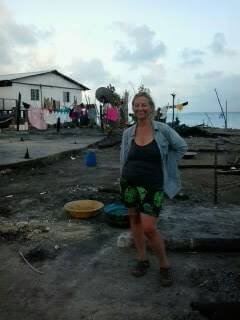
Antilino made an appointment for me and Fabio to go talk to the tribal chief the next day. Apparently, every residential island has a long communal building located in roughly the middle of the island. Inside they are full of old donated church pews but in the very center were 8 strong beams with four hammocks in a row. Fabio explained that the first hammock is always the chief’s hammock and the next three are his advisors in ranking order.
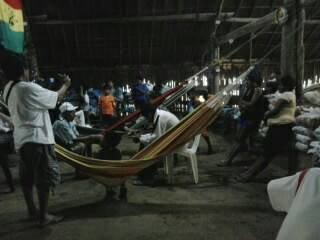
Adjacently, against the wall sat a row of chairs where Fabio and I were led to. At the end of the row of chairs was a sturdy card table where an “educated” man sat writing, writing away, taking notes, keeping records.
Fabio instructed me to shake the chief’s hands and look him straight in the eyes. I did. The chief warmly smiled to me. The chief, the advisors and Fabio got right to work speaking in Kuna about me and mine and Fabio’s situation, seeking assistance and advice. After a few minutes they stopped, Fabio told me to tell the chief “muchas gracias” then led me out of the building. The solution they came to, surprised the hell out of me.
Once outside Fabio explained that we are to return tomorrow to speak to the chief again. This time I will receive three hundred dollars a document from the chief to explain at the airport why I do not have a passport. The money is a loan. I am to return the money plus twenty percent.
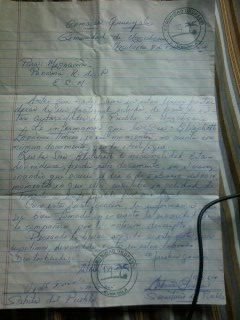
The shocker is that Fabio is giving himself as collateral. The arrangement is Fabio has agreed to spend five hours a day for the next year as a slave to the chief or until I return with the money, whichever comes first.
“Oh my God, Fabio! You must really trust me a lot. I don’t know how I am going to make that work.” I exclaimed. So, basically, the chief is buying Fabio from me for three hundred dollars and if I want him back it will cost me three hundred and sixty dollars. We laughed at how funny that all sounded but this was no joke. This man has children and responsibilities, people who depend on him. Although fear and panic were knocking at my mind’s door I refused to answer. I must stay sharp and focused. After all, I only lost a backpack. Forty plus families lost everything.
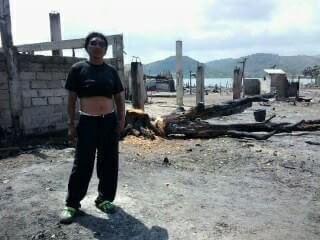
The community shuffled around the remaining hundred or so families on the island to accommodate the forty three families who were now homeless. We were moved into a home of a family that was only a couple with one child. This photo is dark but this was taken in the home.
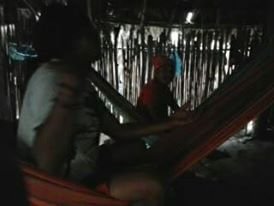
They were sent to another family member’s home while myself, Fabio, Antilino, his wife and three children and his mother-in-law shared their long bamboo home.
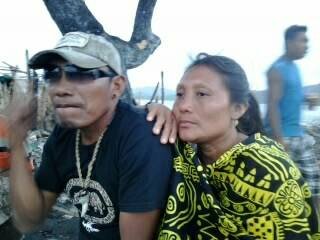
Meals were only sand and ashy rice now except for the fresh hot rolls donated to us in the morning from the baker.
Quickly, Antilino allowed devastation to overcome him. He cried that he didn't know how to begin again with nothing. His downfall was very disappointing especially since he is a well respected leader of the community.
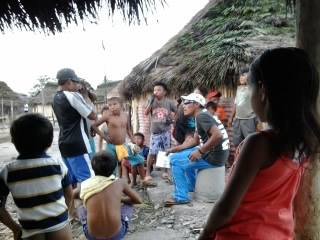
He was drinking more than before and had even taken up doing regular cocaine lines. Before the fire he told me he wanted to rebuild his home to accommodate tourists. One morning we talked alone and I reminded him of this desire. He cried with joy when he began to see this as a new beginning, a fresh start.
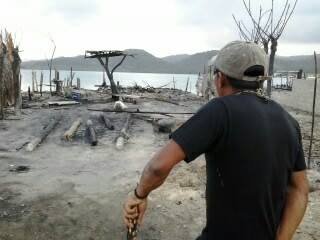
The fifth morning after the fire Fabio and I awoke early to get me to the airplane to Panama City. I put my dirty clothes from the day of the fire back on, put my toothbrush in my pocket with my valuable letter and money from the chief. We crossed the bay water by way of the walking bridge to the mainland where the walk-in closet sized airport sat.
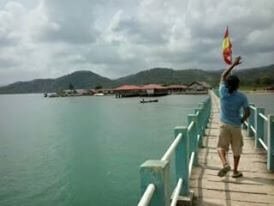
I bought my plane ticket, eighty dollars, then waited for the plane with Fabio by my side. Yep, this photo is the airport.
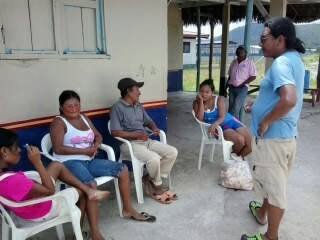
It felt weird to board the little plane with nothing, no purse, no luggage, nothing. The thirty minute plane ride was beautiful flying over the Darian jungle then finally the Panama canal. When we landed at the airport we were instructed to put our luggage on the ground for the dogs to sniff it then get in line to show your passport to the man at the desk. When I showed them my letter they called their bosses in, then the airport security, the airport managers and then a straggle of other curious employees wanting to see me and my funny letter from the chief.
After a series of questions they finally released me to the next jump in my journey. I made my way outside to the front of the airport for a taxi to the American Embassy.
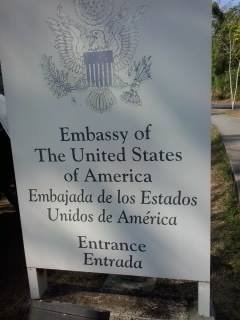
When the taxi driver that I hailed down reported that the he will drive me there but just know, it’s closed today because it’s Sunday. I could feel the flood of tears I had been holding back about to break the dam. What do I do now? I murmured softly, "What am I gonna do?" Panic.
A voice to the left of me, in a deep Caribbean accent heard my murmur and called to me, “ Hey, hey, what’s the matter, what’s going on? Why do you need the embassy?” It was a tall thin middle aged man working the curb, helping people with their bags and getting taxis. After I explained that I’ve been with indigenous people and all my stuff was burned he offered his help. It just so happened that he had stored in his phone the emergency phone number to the American Embassy. After a series of calls, within a couple hours, I was riding in a nice clean Jimmy 4 X 4 with Janet, an employee of the Embassy.
Janet was awesome! She really came to my aid. For the next several hours she drove me around Panama City assisting me in the very difficult task of obtaining a Panama ID. She said that in order to get into the Embassy I would need this. By the time this was accomplished it was time to pick up her daughter from school, we were hungry and it was getting late. Breaking the Embassy rules she took me home so I could use her computer, her free phone for calling the US, get food and a hot shower. The next morning she would take me to work with her so I could begin the process for replacing my passport.
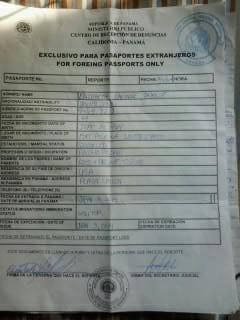
The man behind the window in the Embassy instructed me to walk out to the street, in front of the embassy, to the tents where they are making passport photos. With the passport photos the man created me a temporary passport while I would have to wait four weeks to get my new one since I did not have immediate plans to return to the US.
The Embassy, however, offered to pay for the passport, my night's stay and a flight home if I leave tomorrow. There was no way I could do that. Buying back Fabio from the chief was the most honorable choice I could make. I couldn't abandon him.
The passport price was almost one hundred and fifty dollars. That would leave me with roughly sixty dollars of the chief’s money. I sucked up my pride and called my mother.
If you read my Scar Story Contest entry you would know that I have a super shitty, sucky family. It was very humbling to ask them for anything. However, I survived that and had the Western Union wire of one hundred fifty dollars in my hand within the next couple of hours. Once I paid the Embassy I called Janet and told her about the Hostels I had researched and asked her for advice as to which area of the city I should stay. Not only did she give me great advice about Casco Viejo she drove me there and dropped me off.
Casco Viejo is an old area of Panama City with an interesting history. It’s super safe because the police are stationed in the area but that is because the home of the President is right there. Also, the area is located alongside the Panama canal and right next to a park that holds all kinds of events. Just past the park is a world famous fish market.
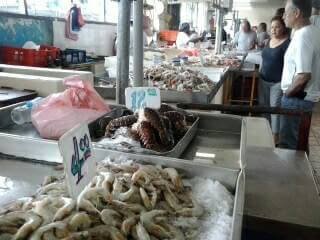
Food stands, parks, restaurants, shopping, buses, several hostels, street artists and abundant nightlife, all right there.
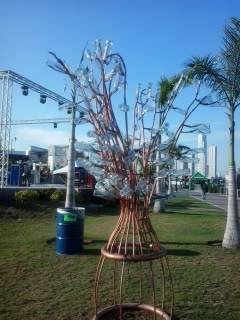
The area was a bit Americanized, splashed with abundant local culture.
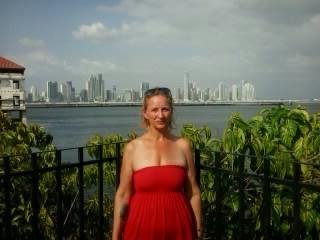
Quickly, I fell in love.
Everything I needed was in walking distance. Because the hostel that Janet dropped me off at was full the attendant cheerfully gave me directions to the Magnolia Inn just over a couple blocks away. I took my plastic bag of newly obtained papers and walked a path I would walk many times over the next several days. The Magnolia Inn turned out to be a very good situation.
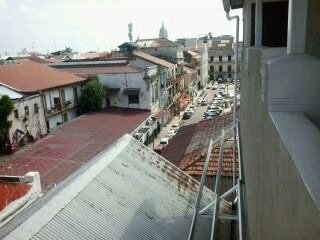
Not only was it comfortable and clean but the owners were happy to help me, were they could, recover from my situation. They gave me permission to put a jar asking for donations at their front desk. For several days I worked with the maids in trade for my bed. They were also okay with me asking for donations from other hostel patrons. The way I raised nine hundred dollars in ten days, now that I look back, was divine guidance.
People loved hearing my story. When they didn’t believe me I whipped out my phone and showed them the photos. Almost everyone offered help in some way. Some just bought me a beer, others lunch, dinner, gave me clothes, shampoo, contact lense cleaner, etc., one guy even paid for my bed for multiple nights. Having nothing at all is such a weird feeling. Many gave me cash. Through Facebook I posted my story and asked for donations by telling about Fabio who is left waiting for me to bring him back to his children.
There was no way to communicate with Fabio. Everyday, I am thinking, he is wondering if I am coming back for him. This was my motivation to stay focused on surviving everyday with as little as possible, wanting to save every penny for getting Fabio back. I needed to get money for getting back to the island, pay the chief, then get myself and Fabio back to David. Then, after that, I don’t know. I calculated seven hundred to be ideal but I ended up getting nine hundred. The nearby Super Mercado sold me a hundred dollars worth of rice, beans, canned fish and milk, coffee, sugar and I even got Antilino a couple spiral notebooks and some ink pens as his collection of notes went up in a blaze.
For the mother-in-law
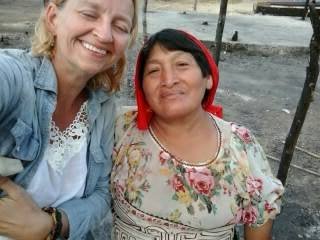
I brought her pieces of traditional Kuna fabric, scissors, needles and thread for making hand-made molas.
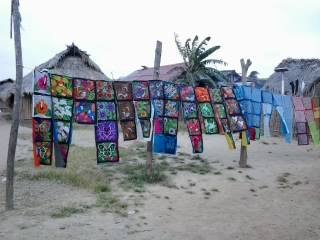
The next morning I bundled together my new things and grabbed a taxi to the airport, arriving at about 4am. After sitting in the airport, on the perpetual stand-by list all day, getting bumped off three flights I decided it was time to rethink my plan. Just like Fabio did, I called the Gunayala Reservation office and explained who I am. Strangely, they said they had been waiting for me to call them. Sounds like a good story in Kuna-land spreads like wild fire. Within the hour the truck was at the airport to pick me up. Finally! I was on my way.
This time, without Fabio, I made the journey in the truck to the coast, squished together with Kuna women and children. Five hours later I was back to the shore where Fabio and I took a boat to the island where I spoke to the old man in English. That night I saw him again and told him of the story of the fire. He was full of hugs and telling me that the story of me and Fabio is all over the reservation. The cold beer he bought me was refreshing.
I’m so grateful that the boat ride, this time, I was able to get a seat in the middle of the boat with plenty of leg room.
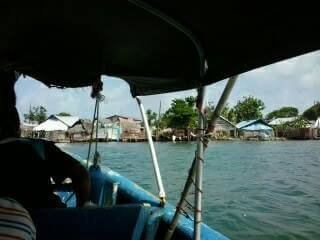
The Kuna woman who sat next to me frequently looked up and smiled to me. The driver of this boat seemed to be much more experienced and confident. He drove way faster than the one Fabio and I were in. Four hours later, much to my surprise, I saw the cemetery. What an exciting and beautiful sight!
When I climbed from the boat onto the shore I saw a couple playmates’ of Antilino’s children. They caught sight of me and took off running down the row of bamboo houses.
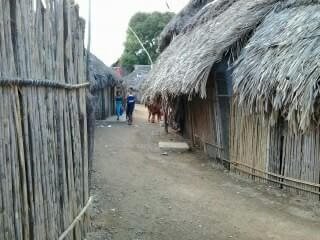
Hoping I did not forget the way, I grabbed my bundles and began my walk to the end of the island where the fire had been, where Antilino’s home was. As I got close I could hear the light sound of hammers. The frames of partially built bamboo homes was not what I had expected to see.
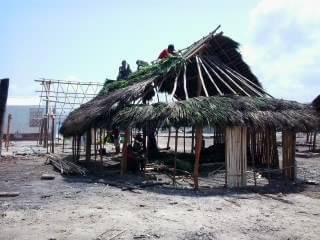
Although I was surprised I kept walking confidently down the wide dirt path while the sound of hammers ceased.
My walk slowed as I entered the space where the Kuna men worked on the new homes.
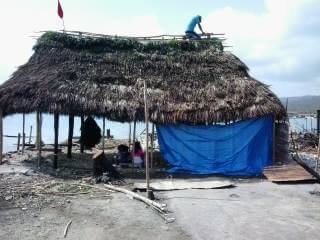
While searching for Antilino’s home with an eye scan I saw all the men looking at me, watching. Antilino popped out of his unfinished home off in the distance then quickly went back in.
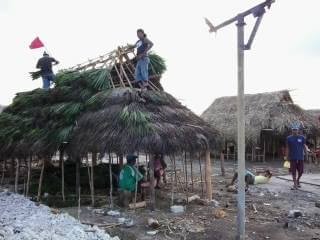
Then...tah-dah!...Fabio walks to the end of the path and stands there, waiting for me while in the background all the other men, in unison, are hooting and watching our emotional reunion. As I dropped my bundles, we embraced and twirled together like joyful lovers reunited.
“I’m here to buy back my Kuna”, I told him as he whisked up my bundles and escorted me to the borrowed home we were staying in when I left. He told me, “Everyday they teasing me, asking where is your white lady, when is she coming back for you, she forgot you.” He was happy to make them eat their words. All the time, he told me, he believed in me, he knew I would come back. Nothing left to do now but lay in a hammock together, holding each other, acclimating to what has taken place.
Through Facebook we frequently discuss when I will be back to Panama and I still tease him about how I own him because I bought him from the chief. After returning to David we parted ways for a couple weeks then spent a couple more nights together at Hostel Bambu. That was the last time I saw him.
You see, because I returned and paid the chief in full, in his culture, I now have a high honor of respect in the community. Due to the way Fabio was raised his relationship with me now contains high amounts of trust. The chief has given me a status of honored family member of Playon Chico. I am always welcome there. As for Antilino, he is doing great, better than ever with his tourist business and rebuilt home.
It took another week to get off the island because the celebration of the revolution brought Kunas back home from all over the world for celebration and reenactment of their victory.
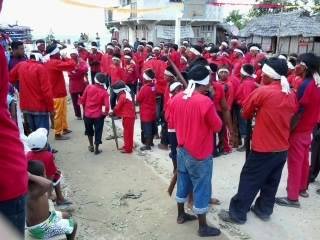
This is their biggest and most attended holiday for all the Kunas.
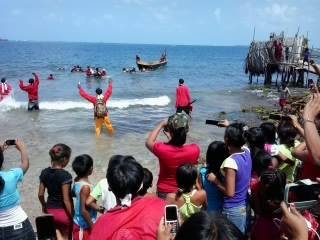
All boats and all planes were full. It took me another month to get funds to get back to the United States which is also another amazing adventure, another story for another time.
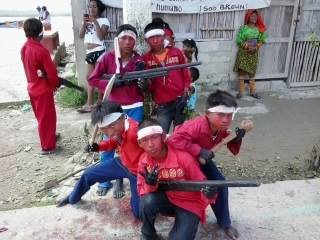
So, now you know how I was accused of being the female Indiana Jones and how I came to buy back my Kuna.
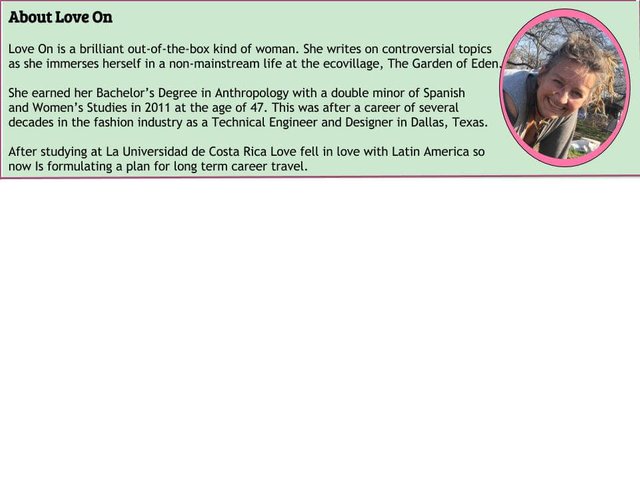
Hello @loveon,
Congratulations! Your post has been chosen by the communities of SteemTrail as one of our top picks today.
Also, as a selection for being a top pick today, you have been awarded a TRAIL token for your participation on our innovative platform...STEEM.
Please visit SteemTrail to get instructions on how to claim your TRAIL token today.
If you wish to not receive comments from SteemTrail, please reply with "Stop" to opt out.
Happy TRAIL!
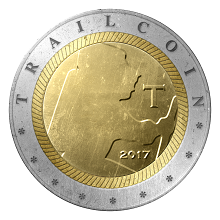
Thank you for the acknowledgement. Super excited for the support.
Fully Entered!
Wow! Now that's a story!!! I love that you did all of this with so little money. This is a very unusual adventure, far from the common hotel/restaurant/sight seeing/tourist story. I feel certain this is one of your many!
If I had had lots of money and a tourist situation I would never have experienced any of this. There is so much more I experienced that I could not even fit into this story. Wow!
Delving into the true local life is what makes travel and exploration of cultures so rich. I feel certain this is but one little adventure in your repertoire. Thanks for putting it our there to share.